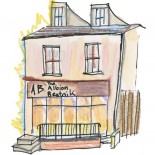The Albion Beatnik Bookstore website (or how to change a light bulb in a tight space on a ladder)
The web page of the Albion Beatnik Bookstore, based once in Oxford, then Sibiu, always neo-bankrupt, now closed for business: atavistic and very analogue, its musings and misspells on books and stuff.
Father & Son
Compared to the likes of Bob Dylan, Carole King, Billy Joel and many other Americans – whose lyrics followed dramatically the contours of the melody and effortlessly displayed an emotional timbre – Britain in the 1960s and 1970s had rarely more than jovial one-off acoustic acts like Peter Sarstedt or Donovan, end-of-the-pier acts like Gilbert O’Sullivan, or the dull and mundane like Graham Nash and Ralph McTell as counterpart. Spells of brilliance from Nick Drake, Sandy Denny or John Martyn aside, our outstanding acoustic songwriter of that period was Cat Stevens (though a Greek Cypriot father, Swedish mother). He churned out hits from 1966 onwards, initially orchestrated period pieces at the behest of overly enthusiastic record producers, and lived the life of a youthful man about town. A near-death bout of tuberculosis and a musical epiphany in 1969 put paid to that, and for most of the 1970s he recorded a raft of heartfelt and tender songs. His album Tea For The Tillerman was recorded in 1970 and catapulted him to fame worldwide with the hit Wild World. His most enduring song was from that album, Father & Son. Without a chorus or middle eight, it is technically throwaway yet maintains interest as Stevens alternates baritone and tenor register for father and then son speaking, its emotional drama heightened by arresting line breaks, his delivery and the developing word rhythm.
Next month when published, David Gordon’s Cat Stevens: My Brother Yusuf will be on offer in the Beatnik at half-price [£10]. Cat Stevens converted to Shia Islam at the height of his musical career in 1977. Stevens was introduced to Islam by his brother David, who converted to Judaism also in the late 1970s, and this book recounts this story. Stevens had been intrigued already by the Islamic ritual call to prayer whilst on holiday in Morocco, and a brush with death whilst swimming in 1976 laid the foundations for conversion: he retired from contemporary music in 1978 and changed his name to Yusuf Islam. He later reflected that his lifestyle change had been too abrupt, but a very gradual return to performance from the late 1990s led to a new album in 2003, with contributions from Paul McCartney and David Bowie. He still performs Father & Son, and, although not intensely autobiographical for Cat Stevens, it is a lodestar too often for filial relationship. Stevens proves here that he is a rival to the great American acoustic songsters. It’s simple and it’s crackerjack.
https://www.youtube.com/watch?v=E-DsYmxznWA

